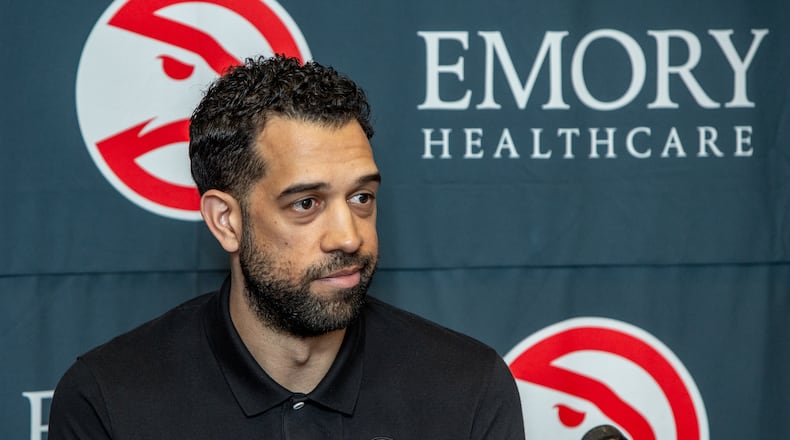Hawks general manager Landry Fields is going down the list of people who will have a voice on draft night. It includes coach Quin Snyder and assistant general manager Kyle Korver, of course. Dotun Akinwale, the senior director of player personnel, gets a vote. Salary-cap specialist Ryan Silverstein and basketball operations director Nick Ressler will have their say.
Those senior basketball executives are part of what Fields calls a “collaborative process and perspectives” in the front office. They’ll get a chance to express their opinions about the prospects likely to be available when the Hawks are on the clock with the No. 15 pick (if they keep it) Thursday night.
“And then ultimately on draft night, when that pick comes, I have to make the decision for us,” Fields said.
Fields has that responsibility for the first time. He was promoted from assistant GM a year ago, but Travis Schlenk still was the boss of basketball operations. Fields got more responsibility when Schlenk resigned in December amid front-office drama that included the growing influence of Ressler, son of team owner Tony Ressler.
Fields already made one big decision by firing Nate McMillan in February and quickly hiring Snyder to replace him. Now Fields will make another big call. The draft pick will be the first of many this summer. The Hawks are seeking to reshape the roster after getting diminishing returns since making the 2021 Eastern Conference finals.
From the outside, it seems like a big burden for Fields so soon after he got the job.
“I can understand that, and I could see it like that,” Fields said. “I don’t necessarily feel that. Maybe that’s a good thing if I’m sitting in this seat. You’ve got to feel it some, but I don’t necessarily feel the overwhelming pressure of it all.
“It almost feels like this is kind of how the NBA is and you are kind of built for it, or you’re not.”
Fields knows it’s a tough business. He played in the NBA for five seasons. Last year, he saw Schlenk get squeezed out after he helped rebuild the Hawks into a playoff team. The draft is one of the hardest parts for a GM, especially when the top pick isn’t among the first five or so.
Fields said the Hawks are likely to stay at No. 15 rather than trade up. If that’s the case, then the player the Hawks select probably won’t play a lot of minutes as a rookie. Fields won’t be expected to find a star that low in the draft. That doesn’t mean the pick isn’t important.
Good players can be found in the middle of the draft or later. They are paid below-market because of the rookie salary scale. The Hawks need more quality players from that pool because they are in financial no-man’s land. They’ve demonstrated they aren’t good enough to challenge for a championship, yet their payroll is pushing against the luxury-tax threshold.
Going above that cliff means limited flexibility for making trades under the NBA’s salary rules. The Hawks are short on future first-round draft picks to use in trades after sending away three of them to acquire Dejounte Murray last summer. Those circumstances make this mid-round pick more important than usual for the Hawks.
It’s possible to draft future NBA starters at No. 15 or later. Schlenk did it twice with No. 19 picks: John Collins (2017) and Kevin Huerter (2018.). The more likely expectation for the No. 15 pick is a prospect who will be a solid pro in time. But the Hawks will need him to become a contributor no later than next season, when the payroll pressure continues to build.
Said Fields: “This is our opportunity to get guys with high upside. It’s not necessarily positional need. It’s all about ‘Hawks DNA’ and how they fit into the system that we’re building under Quin and ultimately who they can become as players.”
Those projections are difficult. It’s what makes the draft so hard to crack. Schlenk’s legacy with the Hawks is the draft-night swap of Luke Doncic for Trae Young. Young is the franchise centerpiece, but Schlenk whiffed on two tries at acquiring All-Star wing players with top-10 picks. Cam Reddish is on his third team, and De’Andre Hunter is a below-average starter.
The Hawks ultimately traded for an All-Star, Murray, to pair with Young. Murray’s contract is up after next season. As things stand now, the Hawks won’t be able to sign him and other veteran players to extensions while staying below the second-tier luxury tax in the new collective bargaining agreement. The first tax tier already is effectively a hard cap for the Hawks, who made salary-saving moves before last season to avoid it.
They can gain some salary relief by getting this draft right. The Hawks also own the 16th pick of the second round, No. 46 overall. They are emphasizing player development with Snyder. There already are three promising young players on the roster with rookie-scale contracts: Onyeka Okongwu, Jalen Johnson and AJ Griffin. The Hawks need to find another one in this draft.
That responsibility is on Fields for the first time.
“Ultimately, when you make a decision, I sit in front of (reporters) and tell you why that worked, or why it didn’t work, and that’s the nature of the business,” Fields said. “So you have to be prepared and ready for that and be able to handle it.”
About the Author
The Latest
Featured


